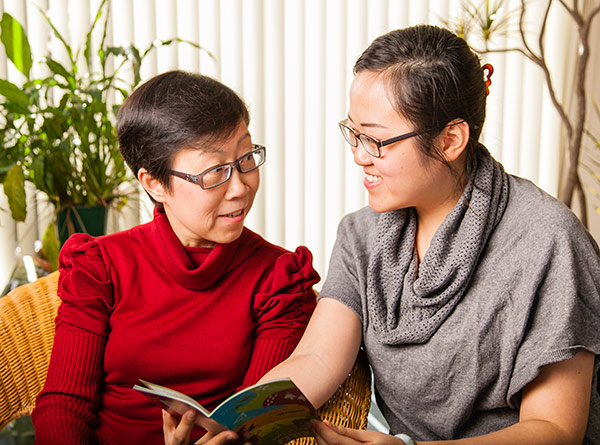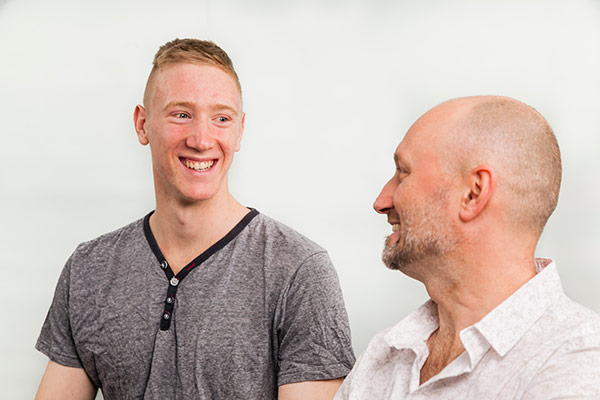Talking with your children about reproductive and sexual health may seem daunting or even embarrassing, but remember, you were young once too and probably had all the same questions when you were their age. You may find it easier to avoid the subject, or assume they will learn what they need to know from school. However, avoiding sexual topics with your children will not stop them from having sex or keep them safe. Parents actually have a lot to offer to their children’s sexual development and wellbeing that cannot be taught through school. Research shows that young people want to talk to their parents about these topics; and those that do, acknowledge their parents as a trusted source of information, and are often more responsible in their relationships.
Starting from a young age, discussing factors that influence your child’s sexual growth and development (such as correct names for body parts, having babies, sexual feelings), can build a good foundation of trust and respect with your child around these topics. Answer your child’s questions honestly and directly when they occur. If you don’t know the answer, find it out together. Short and frequent chats during your child’s development can help keep the lines of communication open right through to their teenage years, and can make discussing these topics seem less confronting. If your child is already in their teens, it’s still not too late to start the conversation.

When it comes to talking about sex, there’s a lot more to it than the act of sex itself and the biology of reproduction. Sexuality education encompasses everything from attraction and sexual feelings; personal values; relationships; decision making; intimacy without having sex; negotiating consent and how to say ‘No’ to unwanted sex; how to have safe sex; contraception; sexual health and STIs; and dealing with break ups.
Discussing these topics with your children will equip them with the knowledge to make more informed decisions about their health and future. It may be difficult to start with, but it will become easier each time. It’s all part of your children growing up into young, well-informed adults.
Starting the conversation
Before talking to your children about sexuality, it’s a good idea to prepare yourself by talking about the topic with your partner or another adult friend to decide what values and messages you wish to communicate to your child. Do your own research on the topics and find out about your local health services so you can advise your child of confidential places they can go for information and support if necessary.
Tips:
- Try to be approachable, unshockable, and available to listen – don’t lose your cool; be confidential and non-judgemental; and let your child know you are happy to discuss these topics with them.
- Talk about how you feel – if you feel nervous or uncomfortable, acknowledge the fact and maybe even laugh about it with your child. Talking about your feelings can help break the ice.
- Be willing to answer questions openly and honestly – if relevant, share stories of when you were growing up or things you always wish you knew at their age.
- Provide the correct information – if you don’t know the answer, admit that and let your child know you will find out and get back to them, or you could find out together.
- Have a sense of humour – it’s okay to have a laugh about it (if appropriate); humour can be helpful and make you both feel more at ease.
- Encourage questions – reward their questions with a positive response, e.g. “that’s a really good question” or “I’m so glad you asked that”. Let your child know they can feel comfortable asking you questions.
- Know your own values – parents are in the unique position of being able to pass on information and personal/family values to their child. Know what your values are and decide how you can express them to your child in a way that is encouraging and supportive rather than demanding.
- Acknowledge that your child may have different views to your own – it can be hard to accept, but your child will have their own opinions and views on these topics. It’s important that you acknowledge this and let them know you are there to support them and their decisions.
- Know your boundaries – know what you are, and are not, comfortable with discussing with your child, and have someone in mind (like a family member, trusted friend or a youth worker) who you can suggest they talk to about those topics.
- Be aware of your verbal and non-verbal communication – your child will learn from what you say and how you react to situations.
- Listen well – really listen to what your child is saying in order to hear what is concerning them – are they asking out of curiosity, or is there an underlying issue that’s worrying them?
- Discuss issues relating to both males and females – children need to learn about both genders.
- Be technologically aware – learn about the different technologies your child is using, and the benefits and risks associated with them, so you can help keep them safe online. Social media provides lots of opportunity for your child to stay connected and informed, however it’s important they are aware of potential risks; including online bullying, sexting and online pornography. Discuss what’s okay and safe to post online and what isn’t.
- Be positive – remember to talk about the fun stuff, and not just focus on the negative consequences of sex – although this is important too. Your child deserves to know and be excited about the positive, pleasurable side of sexuality including love, expressing sexual feelings and having rewarding relationships.
It’s a good idea to use ‘teachable moments’ to ease into a discussion, rather than leaping immediately into the conversation. For example, you could try bringing the topic up by using a TV show with a relevant scenario, or asking what they have learnt about a topic in PDHPE class at school, to lead into a conversation. You could ask your child what their opinion is of something you’ve heard, and then ask more questions from there. Try to have on-going chats with your child – keeping them casual, frequent, and non-threatening rather than intense, one-off conversations. It may take a couple of conversations before you get the hang of it but, the more you do it, the better you will become.

Resources:
-
Answering Children’s Questions About Sexuality
Questions about sexuality can start at any age, so it’s good to be prepared for how to answer those tricky questions. -
Raising Children Network
This website provides reliable and scientifically validated information and resources that can help parents with the day-to-day decisions of raising children and looking after their own needs.The following pages are particularly relevant to sexual health:
Teenage romantic relationships
Sexuality and wellbeing in adolescence
Raising sexually healthy children
Teenage health care: your child’s rights and responsibilities -
Parenting Tips – Talking About Sex
Video from Planned Parenthood Health. -
Talk soon. Talk often.
Originally commissioned by the Western Australian Department of Health, and since updated to suit NSW, this resource was created to support parents, caregivers and teachers when educating children about sexual health. -
Talking Sexual Health
National teaching and learning resource for secondary students concerning STIs, HIV/AIDS and BBVs. -
Enhancing online safety
The Office of the Children’s eSafety Commissioner is a one-stop-shop for online safety information for children, young people, parents and teachers; supporting children to be safe online. -
Family Planning NSW Bookshop
Visit The Family Planning NSW Bookshop for a range of up to date and credible resources on issues ranging from puberty to contraception and sexual health for parents and carers, young people, and people with disabilities.
For further help or support you can talk to:
- Family Planning NSW Talkline 1300 658 886
- Staff at your local Family Planning NSW clinic

